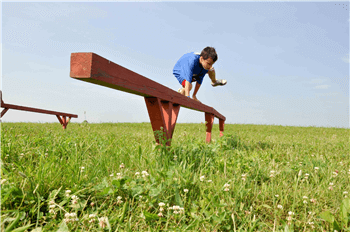How to Teach Your Children about Self-Control
Self-Control for Kids
ALL TOPICS
- YouTube Parental Control
-
- How to see your YouTube history?
- What is Metaverse? Parent Guide
- Put parental controls on YouTube
- Delete TikTok Account without Phone Number
- Ways to block YouTube channels
- Ways to Get Somone's IP Address and Hide IP Address
- A complete guide on YouTube parental control
- What is Fanfiction? Parents Guide
- Kids safe YouTube alternative
- Top 5 TikTok Alternatives
- Methods to restrict YouTube adult content
- Social Media App Parental Controls
- Parental Control Tips
Sep 11, 2024 Filed to: Health & Education Proven solutions
Self-control is the art of controlling one’s impulses, which more than often leads to erratic decisions. Most kids need their demands to be fulfilled immediately. They cannot wait or control their desire.
Since their early days, they get things so easily that they are hardly introduced to the concepts of patience and control. They need not wait for their favorite TV show as it is available in the mobile apps. They need not wait in any queues for any delivery. Parents have a hectic schedule and they believe waiting for anything is a waste of time. This message percolates into the child, which with time, makes them impatient.

Why is self-control for kids important?
Through self-control, kids can imbibe thinking skills that will help them learn to control their moods and behaviors and make good decisions. It has a direct correlation with decision-making ability. Low self-control during childhood days will have a benign impact on your child; an extra piece of cake or few late-night tantrums will not have long lasting impacts. However, the consequences of poor decisions and a lack of self-control during adolescence can be disastrous, both in the short and long term. Their impulsive actions can have a profound impact on their health, finances, and character. Adolescence is the door to adulthood, and the decisions your child will take during these years will mold their future.
Researches have revealed that adults who had less self-control as children are more prone to:
- Health hazards (27% as vis-à-vis 11% of the more self-controlled peer group);
- Earning capacity lower than $20,000/year (32% as vis-à-vis 10%);
- Criminal activities (43% vis-à-vis 15%);
- Addiction to one or more substance (10% vis-à-vis 3%);
Impulse control is not an inborn characteristic. It is developed over time. If you are in the middle of recalling your child’s tantrums and the consequence of it, stop! It is never too late to teach self-control skills to your child. For this, you will not need any professional help. Also, you are in the best position to augment his future by encouraging his capacity for self-control. It is a value that can be reinforced, regardless of age.
10 Tips to guide you in teaching kids self-control:
1. Express emotions
Encouraging your children to express emotions. It is best if we started early. Infants and toddlers mostly cannot express their feeling and thus resort to tantrums. Talk to them and ask them about their feelings. Let them label their feeling as “Anger”, “Happiness” etc. Emotionally strong kids are capable of better self-control as elders.
2. Teach them about anger management
While teaching kids self-control, it is vital to teaching them to control their anger. Show them techniques which will soothe them, like spending some time alone or taking a deep breath. It will surely help them to be more controlled adults.

3. Allow them to explore
Don’t spoon-feed the child and allow him to take his own decisions on small things from early days. Let your pre-school goers decide whether to complete homework or to get scolding by his teacher. Guide him and discuss the consequences with him but don’t compel him or bribe him into doing his homework.
4. Establish Rules
As parents, it is necessary to set boundaries and expectations. Let the child know beforehand about a forthcoming scenario and be clear about your expectations. Like if you are going to a birthday party, let him know that he is going to meet his friends, and he is expected to share. For teens, if you are planning to give a new handset to him, explain to him the nuances of mobile usage and the restrictions he might have to face if he doesn’t listen to you.
5. Be consistent
Be consistent in your reproach. Kids will not obey you all the time, so you will have to correct them whenever required. Every time they repeat their mistakes, be consistent in your reaction. A time will come when they will understand the consequence of their actions and try to refrain from repeating them.
6. Explain the possible outcome of a thing
Instead of forcing the kids to abide by you, talk to them. For example, if your child has an exam coming up and he doesn’t want to study, tell him, “if you don’t study, you will not be able to answer your paper. This will disrupt your learning carve, and you will not be able to know new things.”

7. Get your children to repeat your instruction
If the kid does not obey, make him repeat your instructions. “If you stay awake till late night, you will not be able to get up for school tomorrow.” After saying this ask him, ask “So, what will happen if you stay awake till late at night?” Let him repeat your statement, and once he does that, allow him some time to ponder over his own words. Encourage him to think.
8. Ask your kids to do chores
Chores. Growing up is fun, but life is not all about fun. Let your child enjoy his childhood with few responsibilities. As he grows up, let him take up more responsibilities and share your burden with him. Self-control for kids starts with putting on hold the fun things for a while to do the must-do tasks. Delay his TV time until he finishes cleaning his room.

9. Limit screen time
Limit screen time. Keep your child away from mobile and TV as much as possible as there is nothing that these can teach your child and you cannot. Let your child’s mind explore, and mobiles restrict imagination. Spend time playing with your child outdoor. Let him develop his self-confidence. Then games like Simon Says, Red Light Green Light will bolster your child’s self-confidence by making him more methodical.

10. Set Examples
Last but most important is to teach by setting examples. None of the above tips will be effective if your child perceives you as impulsive. When you exhibit self-control, be vocal about it so that kid understands, like “I so want to watch a movie all throughout the night, but I will resist as it is harmful to my health”.
How FamiSafe is going to help teach kids self-control
Technology has advanced, and new tools have been developed to help you in teaching kids self-control.
Parental control apps like Famisafe can help you in imbibing self-control for kids. Mobile and internet is a must for kids of today’s generation, and these are very addictive. Having a disciplined and controlled life is necessary for the healthy upbringing of better human beings. Let's see how FamiSafe is going to help you with teaching your children about self-control.
- Kids are brimming with curiosity. Any forbidden area attracts them more, and thus the Geofences feature of Famisafe can come as a big relief for you. It will notify you the moment your child enters any specific delimited area. Self-control for kids is necessary to be sure that they do not entangle themselves into any trouble.
- Know the exact location of your child and ensure that he is at the right place at the right time. The Real-time Location will give you the exact location of your child, and thus you will know if your kid was out playing with friends when he is supposed to be at home doing his homework.
- It is tough to stay away from the handset when you find it filled with a plethora of entertainment. Teaching kids self-control becomes inevitable to confirm that they do not use mobiles excessively. FamiSafe’s Activity Report feature will keep you informed about the time spent by your child on the mobile and on each app.
- Constant notifications can be a cause of distraction during study times, so you can use the App Blocker feature to block apps temporarily or permanently in your kids' mobile, as per requirement.
- You can even lock the screen remotely if you find your child not being able to control himself from using it using the Screen Time. Or you can set up a daily screen time limit to help your children get an overall understanding of how much time they are allowed with their digital devices.
- Internet is brimming with information, not all of which is necessary for your kids. To give restricted exposure, use the Web Filter or Browser History feature. Monitor the social networking sites of your kid and ensure his safety.
- Location Tracking & Geo-fencing
- App Blocker
- Web Filtering
- Screen Time Control
- Smart Parental Control Setting
Self-control is a continuous process, and you can’t rush through it. Kids tend to be imprudent, so use the above-listed tips to teach them about self-control. You can also use FamiSafe to help them lead a more controlled life.

Thomas Jones
chief Editor